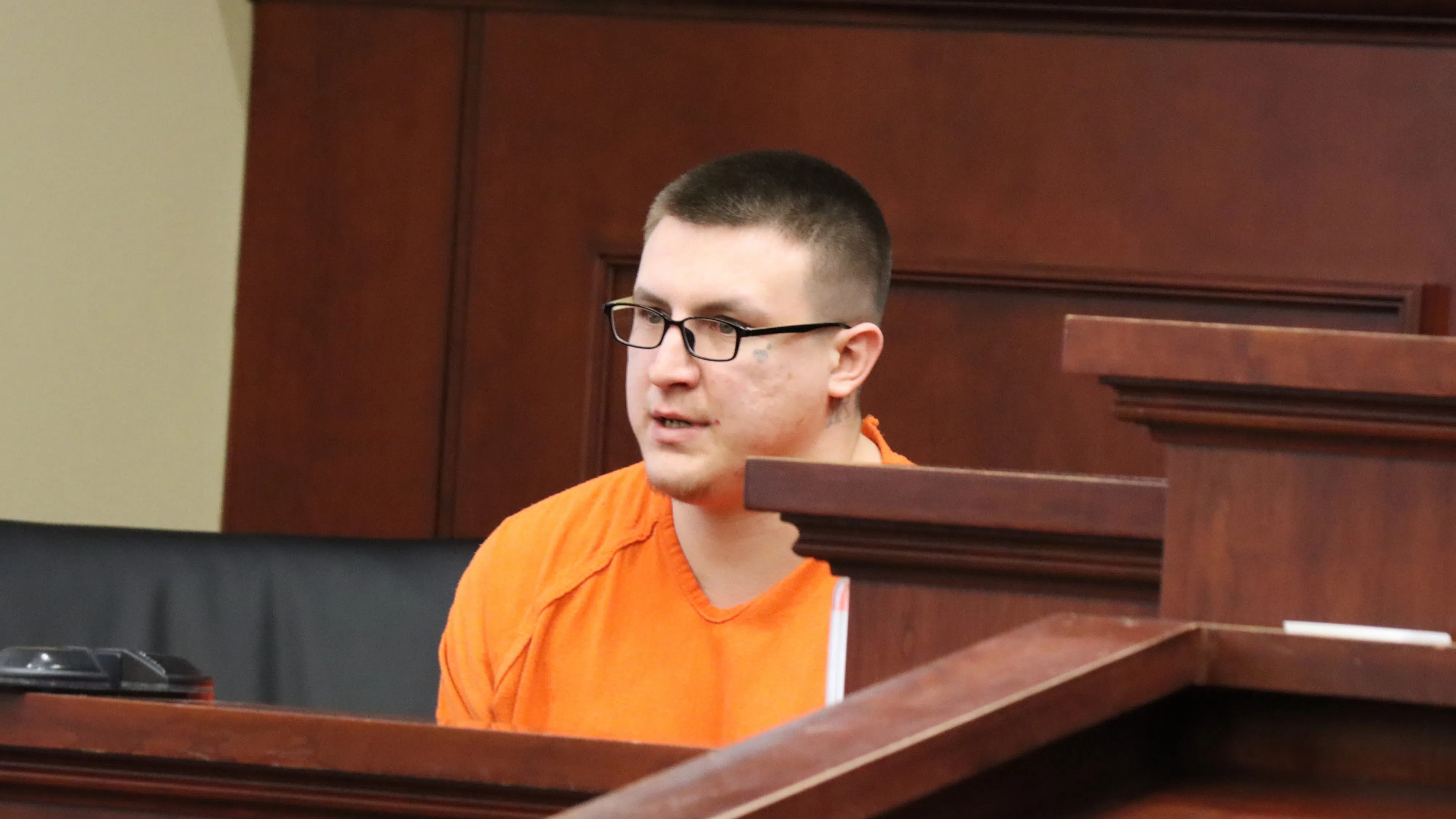By MELINDA J. OVERSTREET
for Glasgow News 1
The man who fatally shot Glasgow resident Melissa Miller outside her home in May 2021 was formally sentenced Friday in Barren Circuit Court to 40 years in prison.
Aaron Rodriguez, now 27, came to Glasgow from Nashville on the premise that he – under a false name – planned to buy a computer off Miller’s grandson, who lived with her, that had been posted for sale on social media. He then fired a gun at Miller from the passenger seat of a vehicle driven by a female.

Melissa Ann Miller
(obituary photo)
Miller was transported to T.J. Samson Community Hospital, where she was pronounced deceased, according to the criminal complaint in the case.
Rodriguez had participated in mediation in early February that led to his agreeing to plead guilty to murder and first-degree robbery,
Commonwealth’s Attorney John Gardner recommended a sentence of a total of 40 years – 40 for murder and 10 for the robbery charge, to be served concurrently – and a $1,000 fine and court costs, according to court documents. At Friday’s final sentencing proceeding that included several victim-impact statements as well as a statement made by the defendant himself, Circuit Judge John T. Alexander agreed with the time recommended by the prosecution. He waived the fine and court costs, though, noting it would be impractical to think they could be paid anytime soon.
Had the case gone to trial, Gardner intended to prosecute the case with the death penalty as an option.
Rodriguez has been lodged in the Barren County Detention Center since his arrest June 9, 2021. He has to serve at least 20 years, including time already served, before he is eligible to be considered for parole, but, as Alexander noted, approval for parole is not guaranteed.
Testimonies and conclusion
Two family members of Miller’s took the witness stand to read aloud what are called victim impact statements. First up was Anthony Goode, who said he is Miller’s youngest brother, asked Rodriguez how he could place the value of a computer over a person’s life.
“You took something from us we can never get back …,” he said, becoming emotional the more he read.
He spoke about how his sister, whose obituary said she was a caregiver for the elderly, took care of everyone else, and he’d seen her give her last dollar that she was going to use to buy her own food to someone else.
Goode said that for him to take Melissa’s life, to do so in front of her grandson and then leave her lying there like a dog that had been hit on the side of the road was one of the most cruel acts he’s known, and it makes Rodriquez one of the worst monsters out there with no regard for anything or anyone other than himself. He called him cold and heartless.
“In my opinion, your sentence today is not justice,” he said.
Goode said he thought Rodriguez should never get out of prison, that he thought that was fair because he had taken away his sister forever.
“You just don’t realize how loved that woman was,” he said.
Howard Miller, the second-oldest brother of the deceased, commonly referred to by her family as “Lissa,” first read aloud the statements of three other family members before reading his own.
The first of those he read was from Misty Miller, who was in the gallery, and is a niece of Melissa Miller’s. She had written that Melissa was more like a sister and best friend than an aunt to her, and took in Melissa’s grandson, D.J. Miller, who had been living with Melissa and witnessed the crime at the age of 15, and he’s had a hard time dealing with the loss of his grandmother.
She also said that she hoped Rodriguez would never get out of prison and she had hatred in her heart for him.
“You have no idea what you have done to that kid,” Misty had written.
Next was a statement from D.J., who was also present in the gallery and had written that his grandmother had spoken to him about selling his computer his mother had given him before she died, but he was no longer using it, and Melissa later posted it for sale on social media and had let him know someone was coming to get it. After he got home and they got it packed up, they sat outside and talked for about an hour before Rodriguez arrived, D.J.’s statement said.
He continued that when the car pulled up, he greeted them and put the computer in the trunk while Rodriquez was supposedly getting the money out of the glove box to pay for it, but then they tried to leave real fast. Melissa leaned into the window and then screamed that Rodriguez had a gun, and a moment later, she was shot.
“I didn’t think I was going to make it either, because I had to run around to the opposite side of the car to get inside,” D.J. had written, adding that he screamed for his uncle then, and the uncle saw her in the yard ….
“I want him to have the electric chair so he’ll be where he belongs faster,” D.J. wrote.
Next, Howard read the statement of Tabitha “Tabby” Ryan, another niece of Melissa’s, but she was not present in the courtroom. She had, when she was 16, lost her own mother to cancer, and Melissa had become more of a mother to her afterward, but they had been close well before that. Her husband is in the military and they no longer live here, but they would often stay with Melissa when they visited and her children called Melissa “Nanny,” and she spoiled them as a “nanny” would, she had written.
“There’s a void in our lives that doesn’t have peace because this wasn’t a natural way to die,” Ryan wrote. “She was cold-bloodedly murdered.”
Ryan said Rodriguez didn’t deserve life or even prison, where he would receive three meals a day and be able to sleep in a bed. She wrote that she thought murderers should be sentenced to death, which would be a fitting punishment that would also deter more murders.
She added that she hoped that not a day or night would go by that Rodriguez wouldn’t see Melissa’s face.
Finally, Howard read his own statement, listing some of the other family members.
He said it was hard to know what to say to someone who did what Rodriguez did, and a lot of words and emotions had passed through his mind.
“Lissa’s death will have a lifelong impact on our family,” he said, adding that even if justice is served, their scars will last forever.
“God commands us to forgive those who commit crimes against us,” he said, then having to pause and then resuming as he and his voice became fraught with emotion as he continued, saying that God wants true confessions and repentance.
As his emotions rose again, he told Rodriguez that he has a long road ahead of him, and he could let it destroy him or he could make the necessary changes in his life, and he read verses from the Bible he’d written into his statement that he wanted to Rodriguez to consider.
He told Rodriguez that he could become a better person.
“I do not desire you to die,” he said, crying, “but you should certainly consider that there is a God in heaven who is your judge.”
Howard said he hoped Rodriguez would come to know him in time and would repent.
Rodriguez then took the stand himself, and apologized to D.J., in particular, and the others for taking Melissa from them.
“I lost my dad at a young age,” he said.
He said he has remorse and there was no excuse for what he had done, but he had been taking drugs at that time.
“I just want to say I’m sorry, and I understand your hurt, your hate … your emotions,” Rodriguez said. “I hope you find it in your heart to forgive me, but, if not, I understand.”
Alexander then spoke for several minutes, noting that sometimes it may feel the justice system is cold and unfeeling, but even though those in the justice system who have no familial relationship to Melissa Miller are affected by these things to some extent.
“We’re all human beings,” Alexander said.
He said that no matter what they did, though, they can’t make those who have suffered the loss whole, because they cannot restore things to the way they used to be.
“Everybody does the best they can do, and there are a lot of things to take into account. In this case, a tremendous amount of work has gone into attempting to get a fair resolution,” the judge said, adding that it’s not a perfect accommodation because some wanted a stronger sentence and some wanted less of one, but he felt that both sides had done a good job in reaching this outcome.
He acknowledged that Rodriguez’ family, some of whom were attending via Zoom, were also experiencing a type of loss and they had his sympathies as well.
He told Rodriguez that his life could have gone in a different direction, and he hated that it hadn’t. He said some unfortunate things had happened in Rodriguez’ past, but they are not an excuse for his actions.
“Drug use is not an excuse for what you have done …,” the judge said. “It is one part of the explanation.”
Alexander said it helps them understand part of why and how it happened, but it can’t be used to condone his actions. He said individuals involved in certain kinds of lifestyles can often find themselves a split-second away from a bad decision, and the No. 1 way to prevent such things from happening is to never get yourself into that position in the first place.
It was not part of what the judge said, but the majority of homicide cases in Barren County, at least over the past decade or so, have had drug use as a factor to some degree.
After announcing the sentence, he acknowledged part of Howard’s words that he particularly liked and restated them with a paraphrase. Alexander told Rodriguez, “If you’ve got life, you’ve got hope.”
He said he hoped Rodriguez would do what he could to improve himself in the coming years, and maybe he could even help others.

Comments